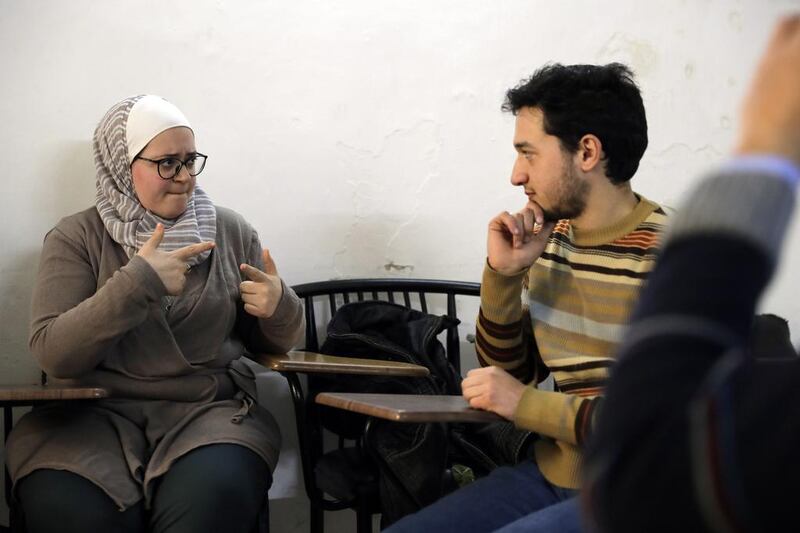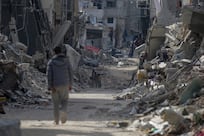DAMASCUS // They are living through the war, but do not have the words to talk about it. But at an NGO in Damascus, two young deaf Syrians, Bisher and Ryad, are working to create special sign language characters so thousands of Syrians like them can talk about the war that has ravaged their country for the past six years.
“We had to invent words that didn’t exist in the vocabulary of the deaf in Syria so they can exchange information and express their feelings about the violence,” said Wisal Al Ahdab, 26, a biomedical engineer and deputy head of the EEMAA association working in the Midan district of the Syrian capital.
For example, raising the little finger twice represents “I” and placing a thumb on the index finger and the middle finger makes an “S”, to signify ISIS, (ISIL) the extremist group. They have also come up with a sign for the Arabic acronym, Daesh.
For the government, the sign is two fingers placed on the palm, like the two stars on Syria’s national flag. But three fingers means the rebels, whose flag has an extra star. Two hands placed over the eyes signifies a kidnapping., Once the new signs have been finalised and agreed on, video footage of them is taken and posted on Facebook so others with hearing problems can access and discuss them.
Officially, there are about 20,000 deaf people in Syria, but EEMAA chairman Ali Ekriem, a computer engineer, says the real number is five times that. And the deaf suffer twice over, he says, living through a war without being able to understand or be understood.
The horror of incomprehension and ensuing realisation can be both dangerous and heartbreaking, says Ryad Hommos, 21, who is helping to create the new signs. While he and his family were fleeing from the fighting in their neighbourhood, snipers shot his mother, uncle, aunt, three cousins, a brother and their baby sister.
But Ryad couldn’t hear the shots. ”Because I wasn’t expecting it, I didn’t understand what was happening at first,” he says. “I saw my mother slump down and then my cousins fell. It was only when I saw my little sister’s head explode that I finally realised we were under fire.”
Another of his brothers was later killed by shelling as he played football in the street. Ryad now works in a cable factory, but remains haunted by the horror of what he has seen.
Even the day-to-day navigation of a war zone can be risky, such as being stopped at one of the capital’s many checkpoints.
“You have to make yourself understood using gestures, and often those in charge at roadblocks think we’re mocking them,” says Mr Ekriem. “Before, most deaf people avoided putting their disability on their ID cards, but now everyone does it to show at checkpoints.”
Mr Ekreim’s 32-year-old sister Bisher knows the danger of misunderstandings all too well. In 2011, she was on her way home in Damascus when she found herself caught between anti-regime demonstrators and members of the security services. She tried to escape down an alleyway in Midan, “but no one could help me because I could not communicate and the situation started to get worse”.
Eventually, Bisher managed to explain her situation to a passer-by and was taken to safety, but she is now so traumatised by the experience that she no longer dares to venture outside.
In July 2012, rebels seized most of Midan before the army recaptured the district in a ferocious battle. At the time, Bisher’s mother told her to pack her things but did not explain that they were fleeing.
“Everyone was terribly nervous. They’d pull me in one direction then push me in another. No one talked to me, no one explained. They just wouldn’t let me near the window,” she says.
Not understanding the urgency, Bisher took her time packing, which angered her family..
“My mother was treating me like I was stupid. I’m not stupid, but no one explains anything to me,” she says.
The Ekriem family sought refuge in Lebanon for two years, coming back to what they say is a different Damascus. The divisive sectarian rhetoric has even permeated the deaf association, and many of its Christians have left.
“The war blew everything apart,” Bisher says sadly. Even her friends have become “aggressive” towards one another, she says. “I hope one day we’ll meet again, and that the deaf can find a shared language once more.”
* Agence France-Presse





